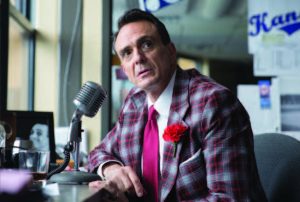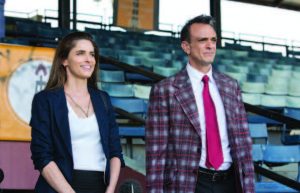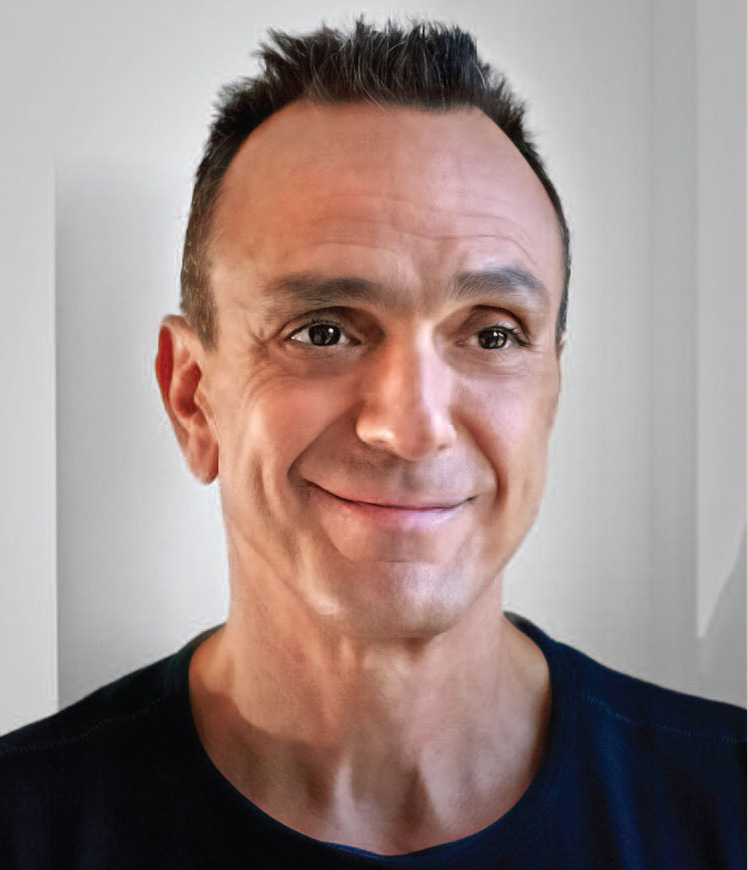You’ve seen Hank Azaria’s face a hundred times and heard his voice a thousand more. Or maybe ten thousand more. Fans of The Simpsons know him as the man behind the voices of ill-tempered bartender Moe Syzslak, gluttonous police chief Chauncey Wiggum, sad-sack Comic Book Guy, hillbilly Cletus Spuckler and America’s favorite convenience store clerk, Apu (“Thank you come again”) Nahasapeemapetilon. Azaria’s over-the-top film roles include fork-flinging superhero The Blue Raja (Mystery Men), 1950s sports legend Patches O’Houlihan (Dodge Ball), megalo-maniacal pharaoh Kahmunrah (Night at the Museum: Battle of the Smithsonian) and inept houseboy Agador Spartacus (The Birdcage). To this long list of indelible characters add Jim Brockmire, the title character in IFC’s Brockmire, a new comedy co-starring Amanda Peet. The show follows the travails of a legendary announcer banished to the bush leagues after a profanity-filled on-air meltdown. Gerry Strauss talked to Azaria about what it takes to slip into the shoes of one unique character after another…and what makes his newest role the culmination of a long, personal journey.

Courtesy of IFC
EDGE: You have a particular talent for creating scene-stealing characters. How does that differ from being an actor who inhabits a character for months or years?
HA: It’s fun. It’s not boring. You do get to switch things up. Even if it’s as simple as going back and forth from comedy to drama and, let alone going from a guy who’s kind of unhinged, to somebody who’s rather sweet, then to somebody with a Latin accent, then to a guy in law enforcement. Whatever it is, it’s fun.
EDGE: Is it a way to learn about the world?
HA: It is. As I take on a different role, I tend to learn about what that person would really be like. It’s a great way to discover how different people live and think. That’s the easy part for me. I became an actor because as a teenager, I was very insecure and did not want to be myself. I wanted to be anybody but myself. I discovered that, in order to do the craft of acting well, you have to reveal yourself to an extent. Still, I like that chameleon aspect of what I do. Vocally, that’s easy for me. A lot of times, I feel like if I find the way a character sounds, I also instinctively know how he thinks and feels. I don’t know why that is.
EDGE: Jim Brockmire is an old-school, throwback sports announcer. Do you tend to gravitate towards characters that harken back to the past?
HA: Oh, for sure. That’s like a major theme of Brockmire. Old-school dude in a modern world. I grew up watching and listening to a lot of those voices. I’m 52, so my memories go back to about 1969, 1970, and to an extent those guys were still around. A lot of them had very distinct voices. Any distinct voice, any vocal anything, really made a huge impression on me. And still does. I always was asking myself, “Why are they talking like that?” I was always noticing the way folks sounded, and asking why they sound like that. Those baseball announcers especially. I’d wonder, Why is this the voice that delivers sports and commentary and information? Then I started wondering if these guys were like this in their private lives, if they still sound like this when they’re having sex, when they’re eating dinner, when they’re wasted. That was the comic premise of Brockmire that we started with—as well as the fact that these guys can basically say whatever they want on the air, as long as they get the count right. Then it kind of grew into what you just said, which is how does an old-school guy handle the modern world? That became an even more important aspect of the show.
EDGE: When did you begin working on the Jim Brockmire character?
HA: Like I said, it was a voice I was particularly obsessed with as a teenager. By the time I was in my 20s and working professionally as an actor, it was at least in the back of my mind, like This voice belongs somewhere comedically—it should be something. It was a character I did for my friends at poker night all through my life, just announcing whatever was going on in some kind of foolish way. About 20 years ago, in my early 30s, there was a movie script I was working on that never got off the ground. Not about a baseball announcer, but I think it was about a telemarketer who talked with this kind of announcer voice. Then I did it as a Funny or Die short about eight years ago, with the idea that, maybe if people liked it, we could develop it into a TV show or movie. That’s always the plan, and it never happens. But it actually did with this one.
EDGE: I suspect that people might be surprised to discover that Brockmire is a lot more than a comedy about a guy with a hilarious way of speaking. It’s a show with tons of heart, as well as a dark undertone. How do you strike that kind of balance?
HA: It’s a few things. And thank you for saying that. I agree. First, I have to acknowledge Joel Church-Cooper, who is our show runner and wrote most of the episodes himself. Joel’s got the ability to not only understand a guy like Jim Brockmire on the surface, but also to commit to this fish out-of-water, old-school alcoholic has-been in a modern world. He really grasps those things and writes them really funny and really poignantly. That’s what I think you’re responding to: He’s a real guy. It’s kind of my shtick. I like to find strange, vocal personages that just sound funny to me—and the game I like to play is Now let’s fill that person in and make him real.
EDGE: How do the characters you play on The Simpsons come to life? How does the collaboration between voice actors and animators play out?
HA: In animation, the voices are recorded first—whether it’s The Simpsons or whatever last Pixar thing that you saw—you record it like a radio play. They edit together a soundtrack that they think works, and then they do an animatic, which is a pretty cool black-and-white sketchy version of the show or the movie. That gives them a feel for how it’s playing. What we usually do next is write based on that animatic, then do some re-recording based on that animatic, and finally send it off and start the actual process of animating. Once that color animation comes back, you get another round of re-writes as the thing starts really coming together.
EDGE: Is it difficult to re-write animated characters?
HA: It’s pretty easy because you don’t need to go and shoot again in locations, you just need to change lip flaps of characters mouths moving, or add a scene, or whatever it is. During the first 10 or 15 years of The Simpsons, the voice cast was always all together recording. We got to know each other intimately, each other’s timing and whatever. The last bunch of years have changed. I live in New York now, so I usually record on my own. I feel like I work better recording on my own because they’re only focused on me while I’m recording. I can give a lot more choices. And having spent 15 years learning everyone’s timing, we all knew what the other one is going to do before they do it.
EDGE: I know you’ve said that most of your voices and characters are derived from actual people. What’s it like when you run into those people after the fact?
HA: There have been times when I’ve worked with somebody who I did an impression of, and they sort of get wind that you do an impression of them, and they say, “Let’s see it! Let’s hear it.” That’s a highly embarrassing, awkward moment in your life. But no one’s ever come to me like, “Hey, you’re doing my voice there, aren’t you?” I once did a character voice that was based on a guy I grew up with, very distinctly. He came up to me and mentioned that he liked the character, but didn’t realize that it was based on him. That made me laugh. There’s another character, Snake, on The Simpsons that’s based on a guy I went to college with. I said that publicly, and he got a big kick out of that fact. I spoke to that guy recently, and he sounds nothing like how I remembered him! I think it was really only when he was wasted that he sounded like Snake.

Courtesy of IFC
EDGE: Both of your parents were interested in the entertainment industry. Did growing up in that environment set the stage for your own interest in becoming an entertainer?
HA: Yeah, it definitely made an impression on me. The culture of the house was to see what’s going on in TV, music, film, and stage. [My parents] were major enthusiasts of everything, from whatever sitcom was popular to the opera. They really were genuinely all over it. When you’re a kid, you just think that’s what everybody does, but my parents were extreme in their appreciation of entertainment. But back then, kids were pretty much left alone. It’s not like today. You pursued what interested you, and I was majorly interested in entertainment and sports. My parents weren’t all that sports-oriented, but I was very into that. New York’s a great sports town, it’s got everything. I grew up in Queens back when the Jets and the Mets played at Shea Stadium. We lived very close to Shea, so it was like we had a couple of our own teams, not to mention the Knicks. I don’t know if it was particularly a New York thing. Actually, the truth is that it was a TV thing. I was mostly raised by a television set. I watched whatever was on it, whether it was The Brady Bunch, a Mets game—it almost didn’t make any difference to me. It was always going to be the television set.
EDGE: And you were a gifted mimic.
HA: Yeah, big time. I am a mimic, quite literally a vocal mimic. That came too easily to me. What was difficult about acting was being yourself in front of people, revealing your honest emotions. I didn’t like that at all. I had to actually learn to do that. It didn’t come easily to me. I really needed to go to class for that. It was easier for me to learn improvisational comedy skills than it was to learn to be myself in a dramatic scene. But the better you are at that, the funnier you are, I think.
EDGE: You and Oliver Platt started an acting troupe after graduating from Tufts. Was live theater terrifying for you?
HA: The short answer is Yes. I was profoundly uncomfortable acting, really. When I look back, I’m kind of amazed I was so driven to do it and stayed with it. I loved it so much. I guess I saw that I was good at it on certain levels, so I felt compelled to keep doing it. But it took me a long time to relax. It’s amazing I did as well as I did, given how tight I was well into my 30s and 40s. I really feel like it’s only in the last five or 10 years that I’ve calmed down on camera and in front of people.
EDGE: Brockmire is launching on IFC at a time when the bar for quality television is higher than ever. What do you make of this industry?
HA: As a fan of television, which I am—and somebody who’s lucky enough to work in television—I’m so thrilled to see this second Golden Age of Television, this evolution into incredible creative freedom. Freedom of language. Freedom to curse a blue streak. Freedom to talk about whatever you like. Places like Amazon, Netflix, HBO, Showtime, or via cable, FX. IFC said, “Let’s get creative people in here and let them do what they want to do with the show. Let’s let them try what we think is a really good idea, with really smart, funny people doing it. Let’s leave them alone to do what they want to do.” It’s been thrilling. Especially thrilling for me, who is so frustrated whenever I’ve tried to bring things to network. It gets watered down. It gets compromised. I have incredible admiration for anybody who makes a quality network show, given the corporate and creative structure.
EDGE: Is it a lot of pressure or a lot of fun having the freedom to do what you want to do?
HA: It’s so much fun. They’ll say, “You know what? These are our suggestions. Take what you like, leave the rest. If it makes sense to you, do it. It’s up to you.” It’s just a tremendously great thing. It’s why awesome television has been getting made throughout the last decade.





